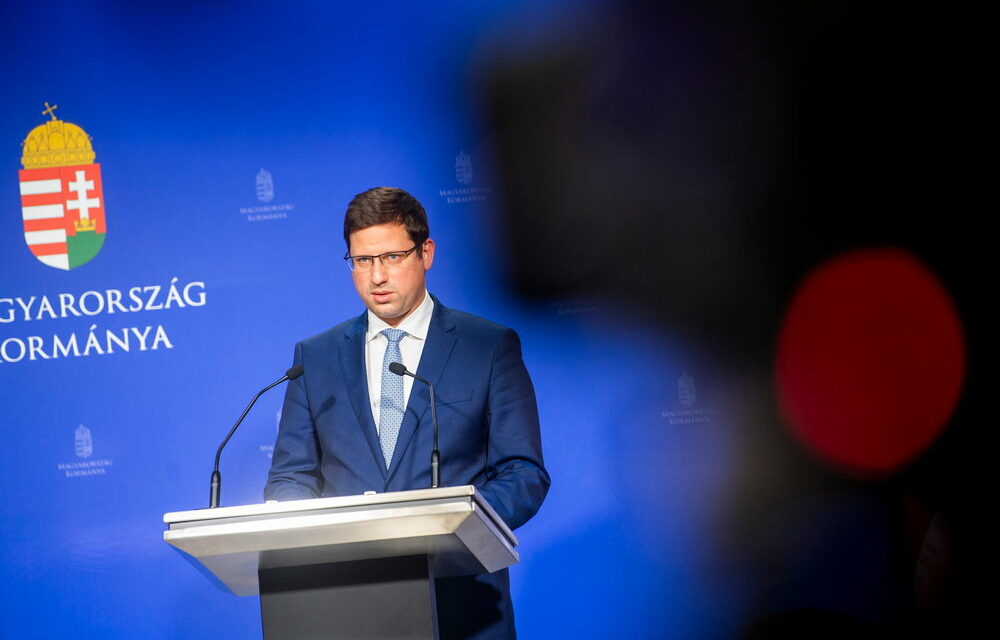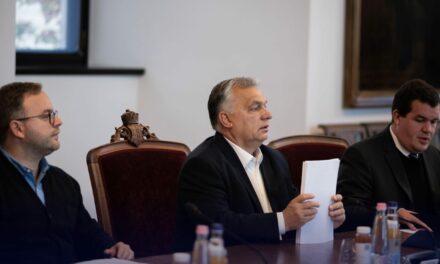Gergely Gulyás said that in recent weeks, more and more statements have come to light that cause serious concern: every day they hear that there is no need for a cease-fire and that the war must continue. These are not the peaceful solution considered desirable by the Hungarian government, but point in the direction of escalation, he emphasized.
The government maintains its position that a ceasefire and peace negotiations are necessary, that lives can only be saved through peace
- stated the minister.
He also confirmed that Hungary does not participate in arms deliveries, but at the same time actively participates in all member states' preparations for defense equipment and capacity increase, which either strengthen NATO's defense capabilities or serve to better equip the Hungarian army.
He said: NATO member countries have clear common rules, they only go to war if any of the member states are attacked. According to common understanding, the last time this happened was on September 11, 2001, so there was no such thing in the last two decades, he added.
He highlighted:
As part of the alliance, Hungary fulfills the tasks assigned to it in strengthening NATO's eastern wing, but in accordance with the NATO constitution, it does so exclusively for defense purposes.
He indicated that a decision on the related plans could be made at the NATO summit in Lithuania in the summer, but at the same time, Hungary was one of the first to create a highly prepared NATO team in which American, Italian, Croatian and Turkish soldiers also participate under Hungarian command. This unit also serves defense purposes, by definition it does not take part in the Russian-Ukrainian war, he emphasized.
He also announced that Hungary would like to participate in the joint procurement of ammunition by the European Union, but the ammunition purchased as part of this will only be used by the Hungarian Defense Forces, and no life-killing equipment will be sent abroad. He noted that there will obviously be member states that send the ammunition purchased in this way to the front. He explained:
it is a group order for a seven-year period, which is beneficial for Hungary.
The minister considers it correct that the European Union has also become more active in the military field, but at the same time reminded: the Hungarian Prime Minister was the first to propose the creation of a joint EU force more than ten years ago. How good it would be if the leaders of the EU member states agreed to this, he noted.
Gergely Gulyás asked all political forces to support the pro-peace resolution proposal submitted by the ruling party representatives in next week's parliamentary vote. He reminded:
a year ago, Hungarian citizens took a clear stand on the issue of peace, and with the resolution they can confirm this obvious will of the voters.
" Hungary still does not want to get involved in the war, we are still sure that the correct behavior is to provide all support to Ukraine and Subcarpathia with humanitarian means, help the Hungarians of Subcarpathia, financially support Ukraine, accept refugees from there, and at the same time, the Hungarian the common will of people should be enough to avoid drifting into war, " he said.
In response to the minister's question about Britain's plans to deliver uranium-containing projectiles to Ukraine, he stated that " this does not lead to de-escalation ". He noted: Hungary's opinion on weapons shipments is known, and it would not be advisable for anyone to transport uranium-enriched weapons.
Gergely Gulyás said about the arrest warrant issued by the International Criminal Court (ICC) against Russian President Vladimir Putin: the statute of the court is not part of the Hungarian legal order because it has not been promulgated, as it is contrary to the Basic Law. He noted that neither Russia nor the United States accepts the jurisdiction of the ICC.
To the suggestion that NATO convened the Ukraine committee bypassing Hungary, he replied:
the meeting can only be a friendly conversation, since some decisions can only be made unanimously. Hungary cannot prevent the consultation, but Ukraine's rapprochement with either the European Union or NATO is not possible without Hungarian consent
he added.
According to him, the problem is that the Ukrainians do not change their education law. The minister stated: they made it clear even in support of candidate member status that
there is no membership or negotiation until basic human rights standards are met in the area of the use of European Union languages. Hungarian diplomacy has no other means
he recorded.
The debate that arose in the government factions about Finnish and Swedish NATO accession was resolved in the case of the Finns, hopefully this will happen as soon as possible in the case of the Swedes, he replied.
A wrong decision was made when the Union did not provide Hungary with compensation due to the market distorting effect of Ukrainian grain dumping
he declared.
He said: six countries expressed their demands, three of them received funding, even though the effect of Ukrainian grain on prices in Hungary is visible. The government has already dealt with the issue, and if it can, it will take countermeasures, he added.
He also indicated: OGYÉI is conducting an investigation into the quality of Ukrainian agricultural products arriving here. He noted:
in this case we are "beaten";
when the union talks about joint solidarity with Ukraine, it would be good if this also applied to not ruining the wheat market of some countries with cheap Ukrainian products. We should either bring this to countries where there is really the greatest deprivation, or Europe will shoulder the burden of this together, he said.
He also reported that the government is constantly accepting support packages for Transcarpathian Hungarians. Currently, he has decided on an amount of HUF 500 million, in which he supports the operation of the Subcarpathian Reformed Church District, the organization of large families and the energy supply of educational institutions, he said.
The activity of the churches, which calls for peace, is greatly appreciated by the Hungarian government and considered important, but the state as a secular power can only add to this in the field of intergovernmental relations and international organizations, repeating again and again that Europe's interest is an immediate ceasefire and peace negotiations, he emphasized.
He also said that since Hungary is not willing to follow the pro-war stance of the majority, the negotiations with the EU are therefore moving much more slowly. If the Hungarian political life could represent a unified position, they would be better off, he said, criticizing the opposition, which he believes is actively contributing to the withholding of EU funds due to Hungary.
He indicated: the funds from Brussels could arrive from Hungary as early as April, since it has fulfilled its commitments, the question is whether Brussels enforces political aspects that are outside the law. He added:
the Union does not meet the deadlines, it does not act lawfully towards Hungary.
He said about the EU's action regarding the child protection law: Hungary will wait for the court's decision, and will comply with it, as it has done so far, but that does not change the goal of protecting young people, especially children, with the strongest and most effective means possible. "We will always have sufficient means to adopt, create, and strengthen Europe's strictest child protection system," he said, adding that there is a good chance that the ruling faction will complete a proposal to tighten the law in the first half of this year, in the summer at the latest.
In response to the suggestion that the European Parliament also joined the lawsuit, he said: they trust that, regardless of who intervenes on the side of the Commission, the court will act solely on the basis of the legislation. He cannot guarantee whether this will be the case, he noted. The action can be considered an exercise of pressure, he said.
He emphasized:
education is clearly a national competence, so sex education is not an EU competence either.
Regarding pedophile crimes, the minister noted that the main problem is not the severity of the punishments, but rather the fact that there is nothing to protect young people over the age of fourteen.
He stated: there is one condition that blocks EU funds in general, and this applies to the judiciary. On this issue, Justice Minister Judit Varga agreed on all issues with the European Commission, the codified text was sent to Brussels, and now the government is waiting for feedback. He confirmed: there is a mutually accepted draft law that the government will submit if approved by the committee.
MTI
Photo: MTI/Zoltán Balogh













